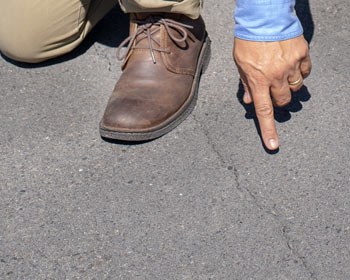MPC
Research on Test to Prevent Low-Temp Asphalt Cracking Could Extend Pavement Life
Posted: Feb 20, 2020
 Research at the University of Utah found that adoption of low-temperature tests for asphalt mixtures will result in pavements that are less susceptible to thermal cracking, thus increasing pavement life and reducing maintenance needs. In the state of Utah alone, more than $20 million dollars is spent annually on rehabilitating highways. Controlling cracking in pavements can potentially extend highway life by 35 years resulting in a 20% maintenance reduction for a savings of $4 million per year.
Research at the University of Utah found that adoption of low-temperature tests for asphalt mixtures will result in pavements that are less susceptible to thermal cracking, thus increasing pavement life and reducing maintenance needs. In the state of Utah alone, more than $20 million dollars is spent annually on rehabilitating highways. Controlling cracking in pavements can potentially extend highway life by 35 years resulting in a 20% maintenance reduction for a savings of $4 million per year.
Asphalt's ability to respond to stresses without cracking is reduced as temperature decreases and as the rate of load applications increases. Consequently, testing of asphalt materials must consider both the temperature and the rate of load application, making testing of asphalt materials more complicated compared with testing of other construction materials. Researchers must consider, not only the accuracy of proposed new tests, but the influence the tests may also have on asphalt mixtures.
The researchers proposed using the bending beam rheometer (BBR) as a test for asphalt mixtures. They found the BBR addresses the cold temperature properties of asphalt mixtures and captures the effect of aging and the use of recycled asphalt pavement on the material. They found that asphalt mixes containing higher amounts of recycled asphalt pavement was detrimental to expected performance, so adoption of the BBR as a specification would likely result in changing the mixture design process to favor mixes with lower levels of recycled asphalt pavement.
Pedro Romero, Ph.D.
University of Utah
Prevention of Low Temperature Cracking of Asphalt Pavements Using the Bending Beam Rheometer
MPC-19-405

